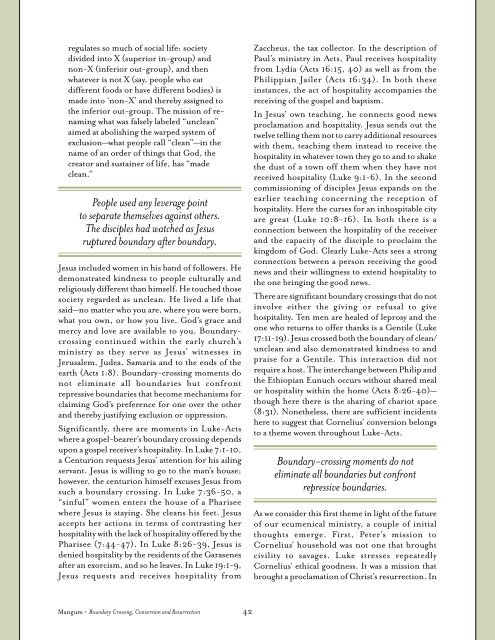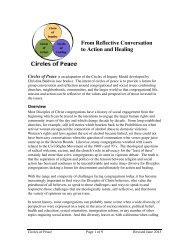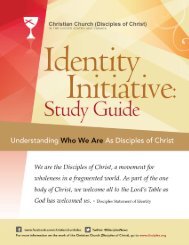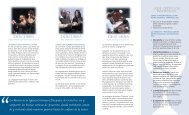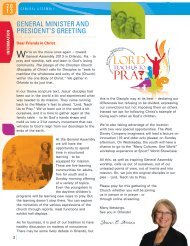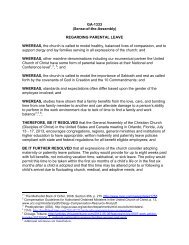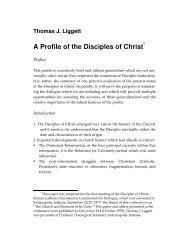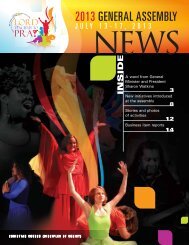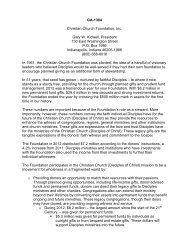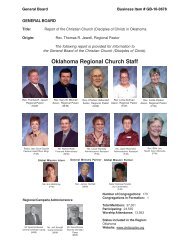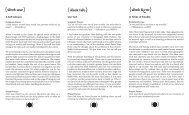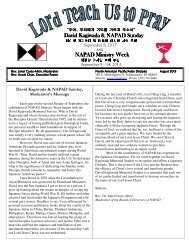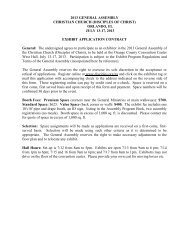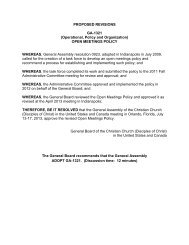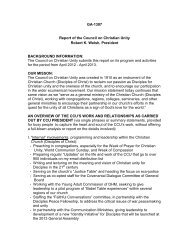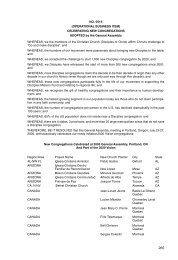RESOURCING THE CHURCH FOR ECUMENICAL MINISTRy A ...
RESOURCING THE CHURCH FOR ECUMENICAL MINISTRy A ...
RESOURCING THE CHURCH FOR ECUMENICAL MINISTRy A ...
Create successful ePaper yourself
Turn your PDF publications into a flip-book with our unique Google optimized e-Paper software.
egulates so much of social life: society<br />
divided into X (superior in-group) and<br />
non-X (inferior out-group), and then<br />
whatever is not X (say, people who eat<br />
different foods or have different bodies) is<br />
made into ‘non-X’ and thereby assigned to<br />
the inferior out-group. The mission of renaming<br />
what was falsely labeled “unclean”<br />
aimed at abolishing the warped system of<br />
exclusion—what people call “clean”—in the<br />
name of an order of things that God, the<br />
creator and sustainer of life, has “made<br />
clean.”<br />
People used any leverage point<br />
to separate themselves against others.<br />
The disciples had watched as Jesus<br />
ruptured boundary after boundary.<br />
Jesus included women in his band of followers. He<br />
demonstrated kindness to people culturally and<br />
religiously different than himself. He touched those<br />
society regarded as unclean. He lived a life that<br />
said—no matter who you are, where you were born,<br />
what you own, or how you live, God’s grace and<br />
mercy and love are available to you. Boundarycrossing<br />
continued within the early church’s<br />
ministry as they serve as Jesus’ witnesses in<br />
Jerusalem, Judea, Samaria and to the ends of the<br />
earth (Acts 1:8). Boundary-crossing moments do<br />
not eliminate all boundaries but confront<br />
repressive boundaries that become mechanisms for<br />
claiming God’s preference for one over the other<br />
and thereby justifying exclusion or oppression.<br />
Significantly, there are moments in Luke-Acts<br />
where a gospel-bearer’s boundary crossing depends<br />
upon a gospel receiver’s hospitality. In Luke 7:1-10,<br />
a Centurion requests Jesus’ attention for his ailing<br />
servant. Jesus is willing to go to the man’s house;<br />
however, the centurion himself excuses Jesus from<br />
such a boundary crossing. In Luke 7:36-50, a<br />
“sinful” women enters the house of a Pharisee<br />
where Jesus is staying. She cleans his feet. Jesus<br />
accepts her actions in terms of contrasting her<br />
hospitality with the lack of hospitality offered by the<br />
Pharisee (7:44-47). In Luke 8:26-39, Jesus is<br />
denied hospitality by the residents of the Garasenes<br />
after an exorcism, and so he leaves. In Luke 19:1-9,<br />
Jesus requests and receives hospitality from<br />
Mangum • Boundary Crossing, Conversion and Resurrection<br />
42<br />
Zaccheus, the tax collector. In the description of<br />
Paul’s ministry in Acts, Paul receives hospitality<br />
from Lydia (Acts 16:15, 40) as well as from the<br />
Philippian Jailer (Acts 16:34). In both these<br />
instances, the act of hospitality accompanies the<br />
receiving of the gospel and baptism.<br />
In Jesus’ own teaching, he connects good news<br />
proclamation and hospitality. Jesus sends out the<br />
twelve telling them not to carry additional resources<br />
with them, teaching them instead to receive the<br />
hospitality in whatever town they go to and to shake<br />
the dust of a town off them when they have not<br />
received hospitality (Luke 9:1-6). In the second<br />
commissioning of disciples Jesus expands on the<br />
earlier teaching concerning the reception of<br />
hospitality. Here the curses for an inhospitable city<br />
are great (Luke 10:8-16). In both there is a<br />
connection between the hospitality of the receiver<br />
and the capacity of the disciple to proclaim the<br />
kingdom of God. Clearly Luke-Acts sees a strong<br />
connection between a person receiving the good<br />
news and their willingness to extend hospitality to<br />
the one bringing the good news.<br />
There are significant boundary crossings that do not<br />
involve either the giving or refusal to give<br />
hospitality. Ten men are healed of leprosy and the<br />
one who returns to offer thanks is a Gentile (Luke<br />
17:11-19). Jesus crossed both the boundary of clean/<br />
unclean and also demonstrated kindness to and<br />
praise for a Gentile. This interaction did not<br />
require a host. The interchange between Philip and<br />
the Ethiopian Eunuch occurs without shared meal<br />
or hospitality within the home (Acts 8:26-40)—<br />
though here there is the sharing of chariot space<br />
(8:31). Nonetheless, there are sufficient incidents<br />
here to suggest that Cornelius’ conversion belongs<br />
to a theme woven throughout Luke-Acts.<br />
Boundary-crossing moments do not<br />
eliminate all boundaries but confront<br />
repressive boundaries.<br />
As we consider this first theme in light of the future<br />
of our ecumenical ministry, a couple of initial<br />
thoughts emerge. First, Peter’s mission to<br />
Cornelius’ household was not one that brought<br />
civility to savages. Luke stresses repeatedly<br />
Cornelius’ ethical goodness. It was a mission that<br />
brought a proclamation of Christ’s resurrection. In


